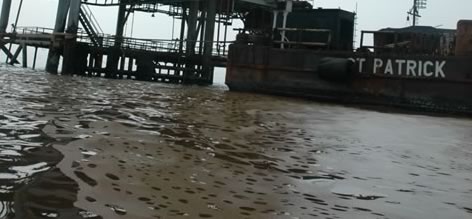LAGOS, Nigeria — An oil spill near the coast of Nigeria is likely the worst to hit those waters in a decade, a government official said Thursday, as slicks from the Royal Dutch Shell PLC spill approached the country’s southern shoreline.
The slick from Shell’s Bonga field has affected 115 miles (185 kilometers) of ocean near Nigeria’s coast, Peter Idabor, who leads the National Oil Spill Detection and Response Agency, told The Associated Press. Idabor said the slick continued to move toward the shore Thursday night, putting at risk birds, fish and other wildlife in the area.
Shell, the major oil producer in Nigeria, said late Thursday the spill came from a “flexible export line” connecting the offshore field to a waiting tanker. The company published photographs of the spill, showing a telltale rainbow sheen in the ocean, but said it believes that about 50 percent of the leaked oil has already evaporated.
The source of the leak has been plugged and experts from Britain were coming to help with the cleanup, Idabor said. Nigerian Navy ships also had been sent into the area to help control the spill, he said.
Shell estimates the Bonga spill likely was less than 40,000 barrels, or 1.68 million gallons. That’s about the same amount of oil spilled offshore in 1998 at a Mobil field. The 1998 spill saw oil slicks extended for more than 100 miles (some 160 kilometers) to Lagos, the country’s commercial capital.
“Since the Mobil spill, this is just about the most major one,” Idabor said.
Nigerian authorities hope to use oil booms and chemicals to disperse or collect the spilled oil, Idabor said. In a statement, Shell said its Nigerian subsidiary already had sent ships out to the slick to use dispersant on the oil sheen. The company also said it would use infrared equipment to trace places where the sheen is the thickest.
However, the size of the spill may be even larger. SkyTruth, a nonprofit group based in West Virginia that uses satellite imagery to detect environmental problems, estimated the oil spill might stretch across roughly 350 square miles (920 square kilometers) of ocean — three times what Nigerian authorities believe.
“The spill could be near the upper limit of what Shell has stated,” John Amos, SkyTruth’s founder and president, told the AP on Thursday. However, he said he needed more information to determine the spill’s true scope.
Bonga sits about 75 miles (120 kilometers) off Nigeria’s coast. It can produce about 200,000 barrels of oil and 150 million cubic feet of gas a day, according to Shell’s Nigerian subsidiary. Production at the field, which Shell operates in partnership with Italy’s Eni SpA, Exxon Mobil Corp., France’s Total SA and the state-run Nigerian National Petroleum Corp., has been halted since the discovery of the spill.
Environmentalists blame Shell and other foreign oil firms for polluting the country’s oil-rich Niger Delta. Some environmentalists say as much as 550 million gallons of oil poured into the delta during Shell’s roughly 50 years of production in Nigeria — a rate roughly comparable to one Exxon Valdez disaster per year. An estimated 11 million gallons was released during the 1989 Exxon Valdez spill in Alaska.
Shell in recent years has said most of the spills in the delta are caused by militant attacks or thieves tapping into pipelines to steal crude oil, which ends up sold into the black market or cooked into a crude diesel or kerosene. Company statistics kept by Shell show spills have dropped as militant attacks in the region subsided, though this single spill at Bonga roughly doubles the amount of oil spilled by Shell this year.
Apparently predicting interest in the spill would grow, Shell already had taken out Internet advertising Thursday on search engines, directing those searching for the spill to their website. Jonathan French, a Shell spokesman in London, said the advertising came in the “interests of full transparency” so people can read the company’s updates on the spill.
Nigeria, an OPEC member nation producing about 2.4 million barrels of crude oil a day, is a top supplier to the U.S.
via Washington Post



